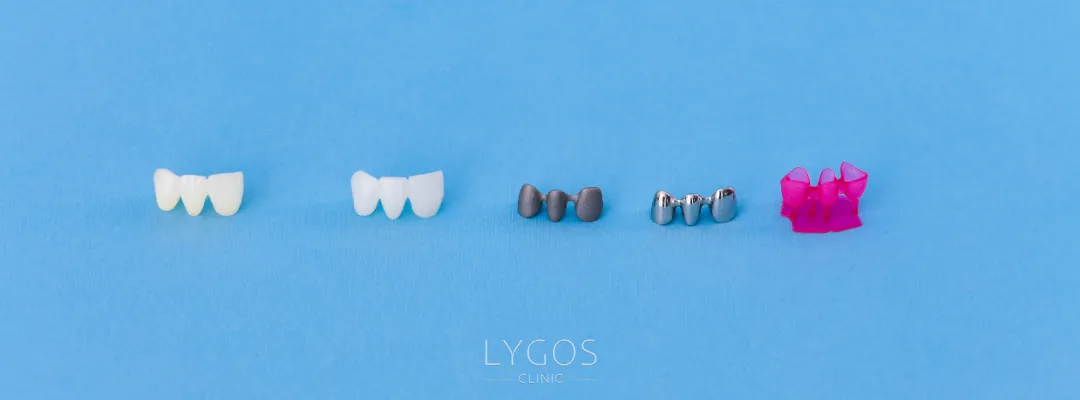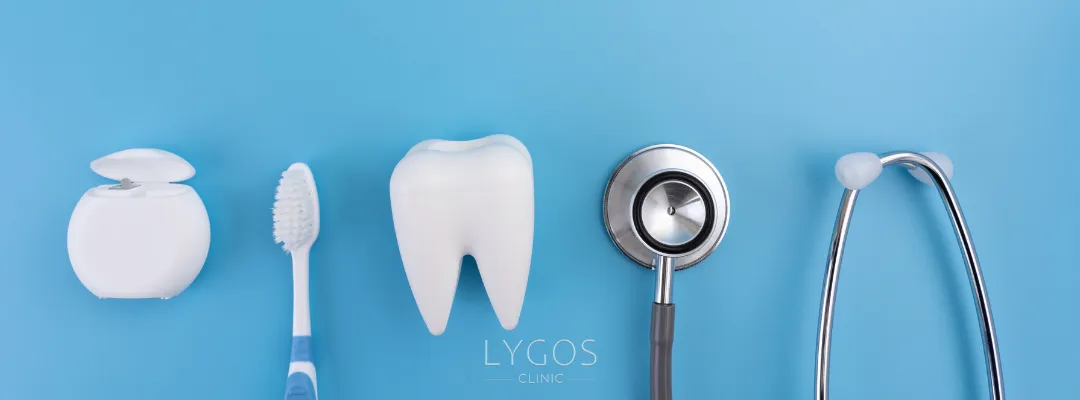Dental Crown | Cosmetic Dentistry | LYGOS CLINIC 2025

How is a dental crown performed?
Dental crowns are a great way to restore your smile and improve your dental health. We have put together a step-by-step guide for you to find out what crowns offer, how the process works and how this treatment can benefit you.
What is a Dental Crown?
A dental crown is a special crown that is placed over a damaged tooth to restore it to its former health and aesthetic appearance. Dentists choose these crowns to strengthen and protect severely decayed or damaged teeth. It is also used to restore the natural appearance and function of the tooth. Crowns are made of ceramic, metal or a combination of both materials, depending on the patient’s needs and the position of the tooth in the mouth. This provides an optimal solution in terms of both durability and aesthetics.
Who is Suitable for a Dental Crown?

There are several situations where you may need a dental crown. Firstly, in the case of severe tooth decay, a crown can provide the necessary support to the tooth if there is too much space for a filling. Crowns are also preferred to strengthen a broken or cracked tooth. This prevents further damage to the tooth.
After root canal treatment, a crown can be applied to protect the treated tooth and ensure its longevity. Aesthetically, crowns also offer an effective solution to improve your smile by correcting discolored or misshapen teeth. Crowns also play an important role in replacing missing teeth, acting as a solid support point for dental bridges. When all these details are taken into account, a specialist should be consulted before applying dental crowns.
What is Done Before Dental Crown Treatment?

Preparing for dental crown treatment is crucial for a successful procedure. Dental crown treatment involves several critical steps. The first step is to schedule a consultation appointment with your dentist. At this appointment, your dentist will carefully assess your oral health.
This will help him or her determine whether a dental crown is the best option for your case. Also, during this visit, your dentist will explain the details of the procedure and explain the different crown materials that can be used. He or she will also answer any questions you may have about the procedure. These steps are necessary to ensure that you get the best results from the procedure.
What are the types of dental crowns?

There are more than one type of dental crown. The most common types of dental crowns are ceramic, metal, ceramic-metal, ceramic-metal bonded and zirconia. Therefore, before undergoing dental crown treatment, you should always consult a specialist doctor and choose the most suitable type of dental crown for you. So, what are the types of dental crowns?
Ceramic: As the name suggests, this crown is made of ceramic materials. This type of dental crown looks very similar to natural teeth and has an aesthetically pleasing appearance.
Metal: Metal dental crowns are made of alloys. They are extremely durable and have a long service life.
Ceramic-Metal: For increased durability, a ceramic dental crown is combined with a metal base. The natural look is preserved, while additional durability is achieved.
Zirconia: This type of dental crown stands out for its strength and aesthetics. Zirconia, which has a very durable structure, can be more costly than other types.
How is dental crown treatment performed?
Dental crown treatment involves several steps to achieve a healthy and aesthetic result. First, your dentist will perform a detailed examination to evaluate your tooth and the surrounding structures. If necessary, he or she will take x-rays to examine the roots of the tooth and the bone. After this evaluation, the treatment begins. Local anesthesia is applied to the area so that you do not feel any discomfort during the procedure.
With the effect of the anesthesia, the dentist carefully cleans your tooth and shapes it so that the crown can fit correctly. Then, exact impressions of your tooth are taken and sent to the laboratory to design a crown that most closely matches the shape and color of your natural tooth. As this process can take several weeks, your dentist will place a temporary crown to protect your tooth during this time.
In the final step, when the permanent crown is ready, your dentist removes the temporary crown and carefully places the new crown. After making sure the crown fits precisely and aligns correctly with your bite, a special dental cement is used to permanently secure the tooth. This step-by-step process ensures a result that is both functional and aesthetically pleasing.
Dental Crown Aftercare

After a dental crown is fitted, proper aftercare will not only speed up the healing process but also ensure the longevity of the crown. Here are some important details to consider when caring after a dental crown:
Be careful while your tooth is still numb, especially when eating or chewing. During this time when you cannot feel your tooth, you may unknowingly apply too much pressure and damage the tooth. Avoid sticky or hard foods for the first few days. These types of food can damage your temporary crown or cause it to dislodge. Eating soft and easily chewable foods will help protect your tooth.
Maintain oral hygiene by gently brushing and flossing around the crown. This ensures that the crown stays in place and that the gums around it are healthy. However, be careful when flossing; sudden or rough movements can dislodge the crown. Be sure to attend the follow-up appointments recommended by your dentist to check the fit and function of the crown. These appointments allow your dentist to assess the condition of your crown and make adjustments if necessary.
If you are experiencing persistent pain or discomfort, this may be a problem that needs to be taken into consideration. Therefore, contact your dentist immediately so that he or she can assess the situation. By following these guidelines, you can complete your healing process smoothly and make the most of the long-lasting benefits of your new dental crown. It is up to you to prolong the life of your crown and protect your dental health.



